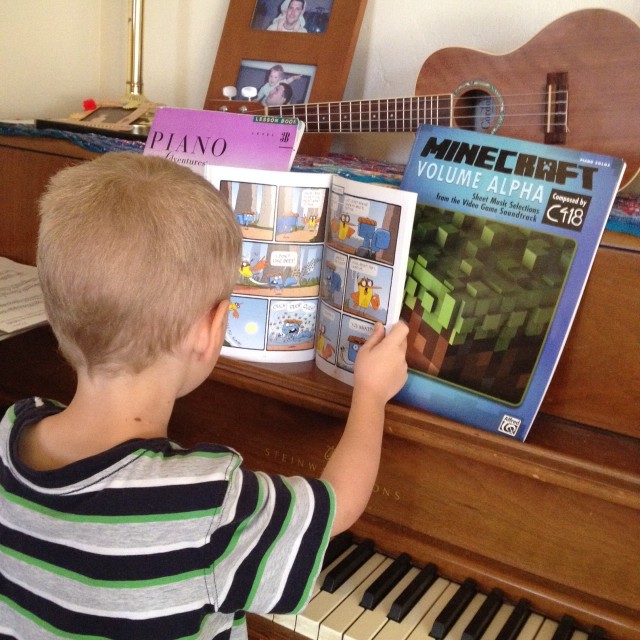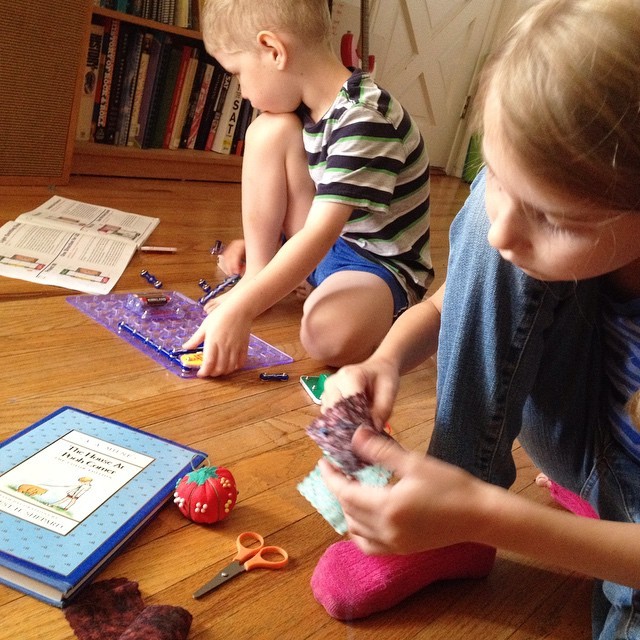Thoughts on ‘teaching’ reading (and why I don’t do it)

Reading a Bird and Squirrel book by James Burks
I chimed in on a discussion on my local homeschooling list about one mom’s concerns that her son had stalled on the learning-to-read process. As usual I found I had a lot to say, so I’m scooping it here (and expanding a bit) in case it’s of interest to others.
I’ll second what E. said: Six is really very young and at this point (and every point, really), the VERY BEST thing you can do is to read aloud a great deal. There are lots of studies to back up what many of us have been discovering and advocating for years about the immense and rather extraordinary benefits of reading aloud.
Some tricks we have used
• We always turn on the captions when our children watch TV. And it’s amazing how much reading they can pick up from scrolling through the DVR. Huck could distinguish between “Little Bear” and “Little Bill” at age three—his first sight words.
• Video games! or apps, etc. My kids have all picked up a lot of reading just from encountering the repeated text instructions and captioning that is a part of many games.
• Comics and graphic novels. Great reinforcement of decoding skills and incentive to read. Plus, you know, FUN. My 3rd child learned to read from Tintin Comics. Her older sisters read them and she pored over the pictures until she began to pick up words. (I read them to her whenever she asked but that stage didn’t last long–she just loved to explore them them on her own!) (I’ve written more about this here.)
• Word games and puns. We are a wordy, wordy family. Dinner-table conversation will often involve why a thing is called what it’s called–what the root word is, where it came from. Someone will hop up to look up a word origin. And scarcely a day passes without some terrible, groan-inducing pun trotting around the house. When I teach kids’ writing and lit classes (I’m teaching three different groups of kids at present), I begin every class by soliciting contributions to our ‘Word Hoard’—asking the kids to look out for interesting words during the week to add to our collection. They really get into the spirit of the game and we have amassed some splendid word piles over the weeks. The boys in my Friday afternoon class have turned it into a competition of sorts, unfurling mile-long words to impress their classmates. I’ve learned a lot of obscure medical terms in the past month, let me tell you.
• Riddles, jokes, joke books!
I am not a fan of 100 Easy Lessons because of so many similar stories of kids getting turned off to reading, or stressed/intimidated/bored–
Books of facts are great for young kids–early reader science stuff, etc. Again, lots of pictures to draw them in & help with decoding.
My primary advice is to not try to “teach” a child to read.
The process can be more organic, less structured. Help them along the way you helped and encouraged them to learn to talk. Read together, allowing lots of conversation and lingering and interruptions to hyperfocus on some little piece of a picture.* Chat about street signs, store names, food labels (kids will pick those up as sight words very quickly and naturally). Text is all over our world, not just in books, and reading doesn’t have to be a Capital R academic exercise. People naturally want to find things out, and reading becomes a means of doing that–so sooner or later, every child will have an interest that drives literacy. What you can do is support that interest. Feed it! Rustle up some intriguing-looking books on the topic, preferably ones with a lot of art.
(Here I come back to video games: one of my girls got so interested in a certain game that she wanted to look up guides for it online, and HER reading took a huge leap forward as she began to devour information about this game. My role was to help her safely find resources on the internet, print out useful pages, provide supplies for assembling a binder (her idea)…so you can see there are many ways for a parent to be involved in the process, guiding, facilitating, without it looking like formal reading instruction–an activity that is so stressful for many children. Lots of so-called ‘reluctant readers’ will inhale anything you give them that’s about their favorite video game. Let them hunt for cheat sites. Who cares if they don’t figure out a game level on their own? They are learning crucial research skills–how to frame questions and find answers, and how to apply that information to a practical task. Hurrah for game cheats!)
Current example: Huck is obsessed with Rose’s Snap Circuits set. This morning I stood in the living room for the longest time, watching him—his back was to me—deeply absorbed in assembling one of the projects in the guidebook. He has worked his way through the entire project book with minimal help, following the picture instructions but also puzzling out chunks of text. Sometimes he asks for help with a mouthful word like “capacitor”—no self-consciousness, no sense that he is young to be expecting to be able to read a word like that. He can’t figure it out, he asks for help. But poring over this book, casually encountering these giant words that tell him things he wants to know, has catapulted his reading skills forward in a way no teacher, no matter how good, how patient, could reproduce. If I made him sit down to a reading curriculum, I can guarantee he would be restless and fretful within minutes. But he’ll spend the whole afternoon immersed in building projects out of this book, interacting with the pictures and text, following complex directions—and consider it ‘playing.’ As in, “Can I play with your Snap Circuits again today?” he’ll beg his big sister.

*********
*Let me elaborate on what I said above about “allowing lots of conversation and lingering and interruptions to hyperfocus on some little piece of a picture.” A lot of adults have difficulty tolerating interruptions during a readaloud. There’s a whole big conversation to be had about how much background activity to allow — like, Legos keep little hands busy but can be very noisy. There are ways to work around that (spread out Legos on the floor before reading, since the noisiest part is the digging through the bin–things like that). But what I want to focus on right now are the interruptions that come when a child is looking at the book with you and starts talking over the narrative–pointing at things in the art, or otherwise being chatty about the book instead of listening to the story. This activity may actually be an indication of a big leap forward in skill acquisition–but we adults don’t always see it that way!
Here’s an example — when Rose was five or six, I remember reading her My Father’s Dragon. She was right at the point of emergent literacy, beginning to recognize words like street signs and store names as I mentioned above. We were about halfway through this short novel as a read-aloud when she started pointing out Elmer’s name on every page. And “the dragon” and “the cat” — words repeated often in the story. But mainly it was the word “Elmer” (the main character). It got to where I couldn’t get through a page, because she kept pointing at the name all over the place. And I had a moment of being irritated and wanting to hush her–now now, let’s listen to the story. But it hit me in a flash that what we were doing together — what SHE was experiencing in this moment — had changed. It had started out “listening to a story.” Now it was READING. She had learned a sight word and was putting this new skill to use, with numerous opportunities to “practice” it on every page. No curriculum in the world could top this skill practice, because it was completely voluntary and completely absorbing her. It was HER activity, not one imposed upon her from the outside.
So, in that hour snuggled beside her on her bed, I let go of the whole listen-to-this-story concept. I kept on reading to her, page after page, but that was merely a background activity providing the vehicle for her discovery. “Elmer…Elmer…the dragon…” — little finger pointing, skipping around the page. We finished the book that way, with Rose only half paying attention to the words I was reading. When I got to the end, she said it was the best book ever and asked me to start it over. The second time through, she listened raptly to the narrative. 🙂 Her brain had finished its self-assigned task. By the time I finished the book for the second time (a week or two later), she was reading very well on her own.
So that’s what I mean about stepping back to reassess an activity and your objectives….if a child is focusing on some part of the story that isn’t your voice reading the words, there is probably a very good reason. A wonderful thing about homeschooling is we have the luxury of time and space to allow this process to unfold at the child’s pace–there is no pressure to ‘get through’ a certain amount of material by a set date.
